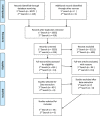Understanding how shared decision-making approaches and patient aids influence patients with advanced cancer when deciding on palliative treatments and care: A realist review
- PMID: 37448166
- PMCID: PMC10632651
- DOI: 10.1111/hex.13822
Understanding how shared decision-making approaches and patient aids influence patients with advanced cancer when deciding on palliative treatments and care: A realist review
Abstract
Background: Patients with advanced incurable cancer face difficult decisions about palliative treatment options towards their end of life. However, they are often not provided with the appropriate information and support that is needed to make informed decisions. This review aimed to identify contexts and mechanisms associated with communication tools, patient decision-aids and shared decision-making (SDM) approaches that influence patient outcomes.
Methods: We used a realist review method to search for published studies of patients (adults > 18) with advanced cancer who were expected to make a decision about palliative treatment and/or supportive care in consultation with healthcare practitioners. We appraised and synthesised literature describing the contexts of (when and how) decision aids and SDM approaches are used, and how these contexts interact with mechanisms (resources and reasoning) which impact patient outcomes. Stakeholders including academics, palliative healthcare professionals (HCPs) and people with lived experience of supporting people with advanced incurable cancer contributed to identifying explanatory accounts. These accounts were documented, analysed and consolidated to contribute to the development of a programme theory.
Results: From the 33 included papers, we consolidated findings into 20 explanatory accounts to develop a programme theory that explains key contexts and mechanisms that influence patient and SDM. Contexts include underlying patients' and HCPs' attitudes and approaches. These need to be understood in relation to key mechanisms, including presenting information in multiple formats and providing adequate time and opportunities to prepare for and revisit decisions. Contexts influenced mechanisms which then influence the levels of patient decisional satisfaction, conflict and regret.
Conclusions: Our programme theory highlights mechanisms that are important in supporting shared treatment decisions for advanced noncurative cancer. The findings are informative for developing and evaluating interventions to improve understanding and involvement in SDM for patients with advanced incurable cancer.
Patient and public contribution: We included patient and public involvement (PPI) representatives in four stakeholder meetings. PPI helped to define the scope of the review, identify their unique experiences and perspectives, synthesise their perspectives with our review findings, make decisions about which theories we included in our programme theory and develop recommendations for policy and practice and future research.
Keywords: advanced cancer; decision support; palliative care; palliative treatment.
© 2023 The Authors. Health Expectations published by John Wiley & Sons Ltd.
Conflict of interest statement
The authors declare no conflict of interest.
Figures
References
-
- Usborne CM, Mullard AP. A review of systemic anticancer therapy in disease palliation. Br Med Bull. 2017;125(1):43‐53. - PubMed
-
- National Institute for Clinical Excellence . Guidance on Cancer Services Improving Supportive and Palliative Care for Adults With Cancer. National Institute for Clinical Excellence; 2019.
-
- Peppercorn JM, Smith TJ, Helft PR, et al. American Society of Clinical Oncology statement: toward individualized care for patients with advanced cancer. J Clin Oncol. 2011;29(6):755‐760. - PubMed
Publication types
MeSH terms
Grants and funding
LinkOut - more resources
Full Text Sources
Medical




